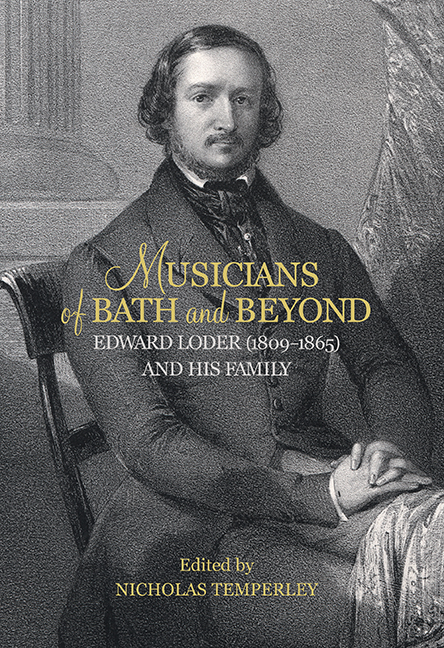Book contents
- Frontmatter
- Contents
- List of Illustrations
- Acknowledgments
- Notes on Contributors
- The Loder Family Tree
- Abbreviations
- Introduction
- PART ONE The Musical Profession in Early Nineteenth-Century England
- PART TWO The Loder Family
- PART THREE The Music of Edward Loder
- EPILOGUE The 1966 Revival of Raymond and Agnes
- Select Bibliography
- Index of Edward Loder’s compositions
- General Index
- Miscellaneous Endmatter
Introduction
Published online by Cambridge University Press: 04 June 2021
- Frontmatter
- Contents
- List of Illustrations
- Acknowledgments
- Notes on Contributors
- The Loder Family Tree
- Abbreviations
- Introduction
- PART ONE The Musical Profession in Early Nineteenth-Century England
- PART TWO The Loder Family
- PART THREE The Music of Edward Loder
- EPILOGUE The 1966 Revival of Raymond and Agnes
- Select Bibliography
- Index of Edward Loder’s compositions
- General Index
- Miscellaneous Endmatter
Summary
THE musical activities of the Loder family, and hence the scope of this book, straddle the late Georgian and early Victorian periods. Until recently, and certainly when I began my own musicological work in the 1950s, this was the least known and most despised period in British musical history – an embarrassing slump between the ascendancy of Handel and the coming of the ‘English Musical Renaissance’. I did what I could to question this view, but with limited effect on critical or even musicological opinion.
The last two or three decades, however, have seen a vast increase of interest in the period, largely because postmodern ideas have shifted the emphasis away from composers and their products towards audiences and their experiences. Rapid social and economic changes make the period an exceptionally interesting one for the study of musical life and the institutions that governed it. Many aspects of musical life in the period have been examined in an astonishing array of books and in a series of conferences. As these matters have been more and more thoroughly investigated and described, some scholars and performers have discovered that there was, after all, much good music being produced in Britain during these years, and that some of it is worth analysing and occasionally reviving in publication or performance. There were even a few composers who deserve a permanent place in the classical repertory.
If there are now two distinct approaches to musicological study, one starting with music and the other with musical life, this book hopes to recombine them. The contributing writers offer notably different areas of expertise, points of view, and conclusions. My own starting-point is a lifelong belief that Edward Loder was a composer of genius, denied the historical position he deserved because of the many disadvantages and prejudices faced by English composers of his generation. But he was also a member of a remarkable family of musicians rooted in the city of Bath; and that city, in turn, has a unique position in the story of English music. Part One of this book begins, therefore, with some general discussion of the prospects faced by would-be professional musicians in the English provinces, then focuses on Bath – and also on Manchester, which would play a special part in Edward Loder's career.
- Type
- Chapter
- Information
- Publisher: Boydell & BrewerPrint publication year: 2016

